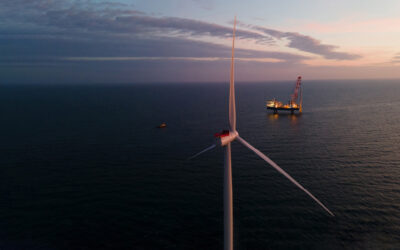Together with production process innovators and fuel cell technology pioneers, Canada plays a key role in the development of the global hydrogen economy.
As the world moves toward decarbonization and countries shift toward the energy transition, traditional carbon-emitting energy sources will soon be electrified, and low-carbon fuels are expected to supply up to 60 percent of global energy demand.
As a low-carbon fuel, hydrogen is essential to decarbonize the top third of Canada’s most energy-intensive and hardest-to-reduce end uses. But Canada isn’t the only country that sees hydrogen as an important part of the solution to combat climate change and improve air quality: countries around the world are developing strategies to inform the optimal supply routes and end uses for hydrogen and to define export strategies.
Canada finds its mission
As part of the Paris Agreement, Canada committed to reducing its greenhouse gas emissions by 30 percent by 2030, and, along with 72 other countries, to reaching net zero emissions by 2050. In a net-zero future, Canada’s economy is fuelled by electricity and low-carbon fuels, which are projected to supply up to 60 percent or more of our energy needs.
To showcase Canada’s leadership in hydrogen, the Canadian Hydrogen Convention was launched in Edmonton, Alberta in April 2022, and will hold its second event in April 2023, bringing together the entire Canadian supply chain to discuss low-carbon hydrogen production, energy infrastructure, storage, and innovations and solutions to help Canada work toward net zero by 2050.
The world’s energy system is undergoing fundamental changes, driven by the need to mitigate climate change.
Consequently, developing a large, clean hydrogen economy is a strategic priority for Canada, to diversify the future national energy mix and achieve economic benefits and net zero emissions.
Beginning with innovation in hydrogen production technology more than a century ago and pioneering fuel-cell technology 40 years ago, Canada has played a key role in developing the world’s growing hydrogen economy and continues to be a leader in industry R&D and technology.
While the pandemic wreaked havoc on in-person gatherings, dmg events, the largest organizer of energy events around the world, found a “silver lining” during the shutdowns.
“Because our business was disrupted like so many others, we started paying attention to some of the other exciting things that were happening here in Canada, and one of those was hydrogen,” says Nick Samain, Vice President of Energy, dmg events.
Canada’s hydrogen supply chain
The resulting three-day convention at the Edmonton Convention Centre featured almost 100 companies involved with the Canadian hydrogen supply chain—and those who hoped to be commercially involved subsequently—and attracted approximately 4,000 attendees.
Along with the technical conference and the business conference during the first two days, the Canadian hydrogen awards offered some “innovative and exciting” awards as well. The third day included a full site tour in Alberta’s Industrial Heartland among other sites.
Twelve international delegations attended from countries including Japan, the U.S., United Emirates, and others, to consider investment, collaboration, technology, and sharing. A tremendous amount of work went into the first convention, for which Samain has much praise.
“We were fortunate to have the volunteers, the Governing Body, and community that came together,” he says. “We couldn’t have had stronger support from our host where the event takes place, the City of Edmonton, Edmonton Global, TC Energy, and great support from stakeholders, the Industrial Heartland, Emissions Reduction Alberta, and the Edmonton International Airport.”
Samain also praises the partners who have pulled together to tackle the challenging and exciting work taking place.
“I’m passionate about this,” he says, adding that it’s a bit of a shock to learn that the first hydrogen engine was invented in 1807, and the first licensable hydrogen fuel-cell vehicle on the road was created in 1966 by General Motors.
“It’s something that’s been around and here in Canada for more than 100 years,” he says.
Many sources, many uses
A clean fuel, that produces only water when consumed in a fuel cell, and that can be produced from a variety of unique sources such as natural gas, nuclear power, biomass, and renewable energies such as solar and wind, hydrogen’s properties make it an attractive fuel option for transportation and power generation applications. It can be used in automotive, home, portable power, and many other applications.
The challenge came with “galvanizing” the hydrogen sector, which Samain says had felt fragmented.
“We wanted one meeting place where we could have a pan-Canadian convention and get it all under one roof: get all those minds and all that innovation, collaboration, and technology, and of course, the political side and the policy side; get the experts on the stage and discuss what’s important and what people think needs to be done,” Samain says.
“Of course, there’s lots of debate, that’s what makes it a conference and a good convention. And then really shine that spotlight on Canada. Let’s attract global attention and investments, let’s put Canada on the map.”
This, he says, helps energy powers and superpowers look to Canada and realize something important with technology is happening there, and drives the industry forward. He adds that those innovations and solutions for low-carbon hydrogen production are the reasons for putting on the show.
“There’s a real sense out there that there’s no single source of energy, at least right now, that can power the world’s demands,” Samain says.
Understanding hydrogen’s capability is vital as the industry looks ahead to the big challenges, from climate change to transportation—particularly with the current high price of gasoline—and how electric and hybrid cars are gaining popularity.
There are also the day-to-day concerns of energy bills at home, and what hydrogen means for exciting innovations there. Can it be blended with natural gas, can we convert, or develop appliances that will run on hydrogen, and can hydrogen really become a low-carbon solution for everyday people?
Knowledge for all
“What gets me up in the morning, concerning the show, is that the Canadian Hydrogen Convention has as much responsibility as anyone to showcase that to the everyday person on the street,” Samain says. “There just isn’t enough publicity out there on what hydrogen is.”
The convention’s mission is to find a way to impart straightforward knowledge and put costs toward the investment that’s needed in infrastructure.
“There are a number of tools in the toolbox that can contribute toward that goal,” he says. “Is it the right goal? Is it the right year? All of those are bigger questions. As far as the convention goes, if you’re coming in April 2023, that’s what you’ll hear talked about by experts.”
Hydrogen also needs to be used much more widely, he says, another goal of both the Hydrogen Hub and the convention.
“We need to build out that infrastructure. We’re able to produce it here in Canada, where we have a huge opportunity to be a hydrogen exporter, but not until we can grow the consumer end. It must grow dramatically because that’s what’s going to spur the growth of the sector,” he says. “That’s when we would see it being used much more widely.”
The 2023 convention will feature experts addressing possible uses, whether in CN locomotives, coach buses, or even planes powered by hydrogen.
Samain notes that the great thing about hydrogen is its versatility. It can be made with nuclear power, natural gas, coal, and oil, and there are many options for its transportation, including pipelines, trucks, ships, and planes. So why is there a reluctance to use it more widely? Possibly competition with other fuel sources, Samain says, or it could be based on the unknowns of cost.
“Is there big infrastructure needed; does it work? Is it public perception? How clean is it to produce? All of those things go back to the reason that the hydrogen convention itself exists, to put that information out there.”
Providing an experience
As for the convention, Samain stresses its accessibility and inclusiveness and speaks proudly about how exciting the entire event is.
“The worst kind of conference is a boring one where a bunch of people talk over and over about the same thing, no questions, and everybody sits at the back and checks their phones,” he says. “That’s not what you see at the Canadian Hydrogen Convention. That’s not the sort of event we run. We think that each day is like a season of your favourite show on Netflix.”
This means plenty of engagement and networking time and three days of dynamic activities.
“We’re a post-COVID world of events,” he says. “If you get people to come for this, they have to get on a plane, get to Edmonton, find a hotel, all of that—and when they finally arrive, their time is valuable.” The value includes meeting people in the industry face to face and talking and learning about the exciting future of energy in Canada, something that can’t be replicated in a Zoom call.
“This is the energy sector going forward. With hydrogen, this is new, this is high-tech, and it’s about the future and the next generation,” he says. “It’s up to that generation to come in and get a hold on something that’s going to change us fundamentally and that’s going to last hundreds of years as we work through an energy transition.”
That change won’t be negative, he adds. It’s exciting and positive and that’s exactly what attendees feel coming to the Hydrogen Convention.
“It’s a pivotal moment right now for hydrogen globally. And it certainly is in Canada as well, and there’s nothing like a convention to bring people together.”













